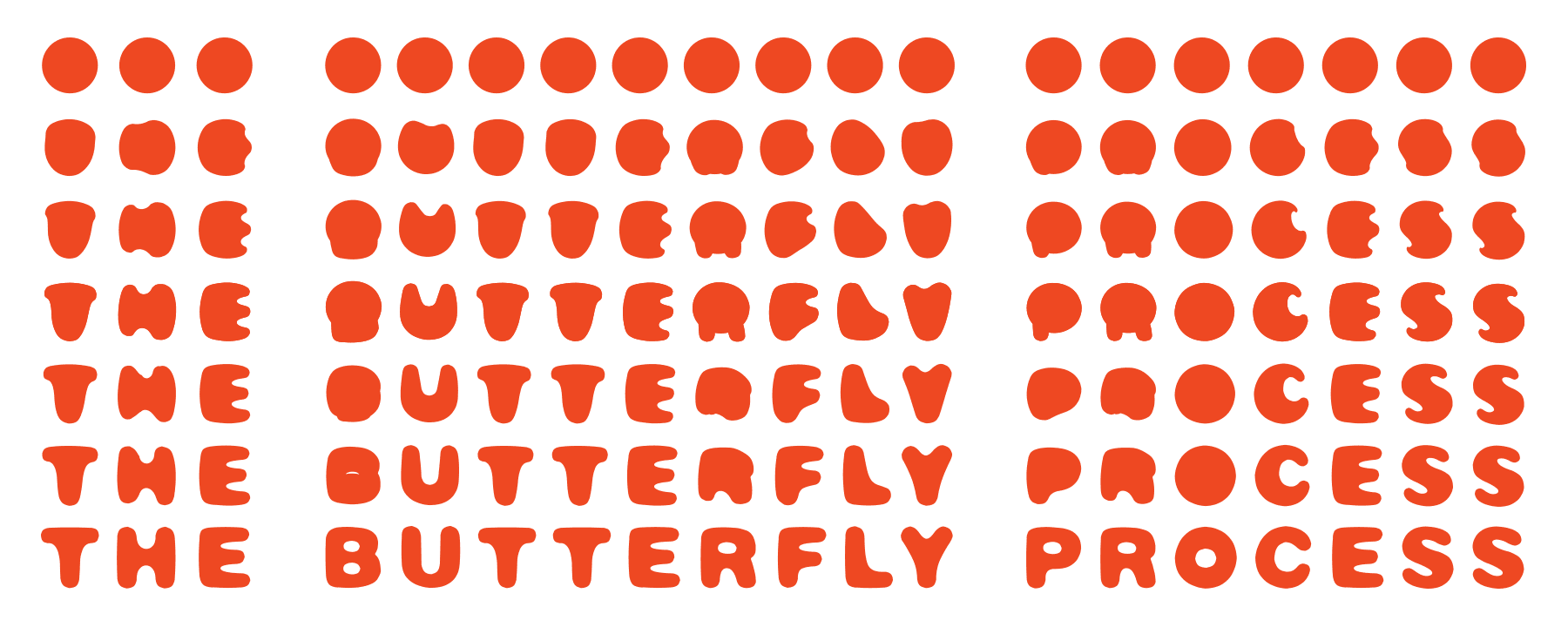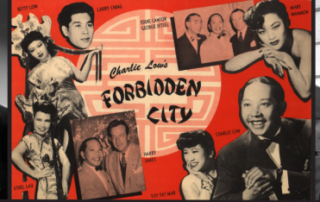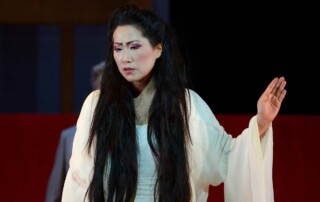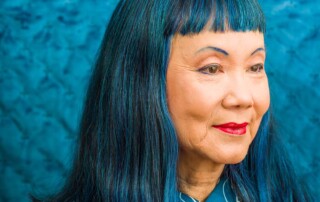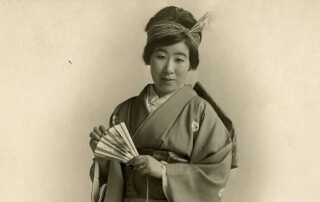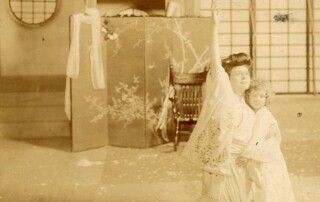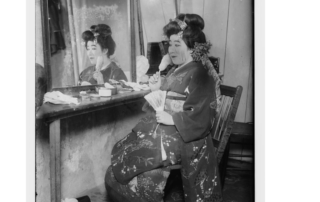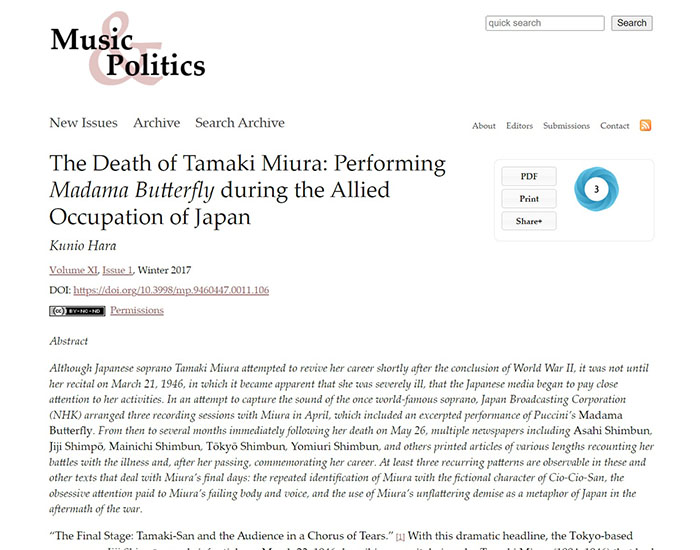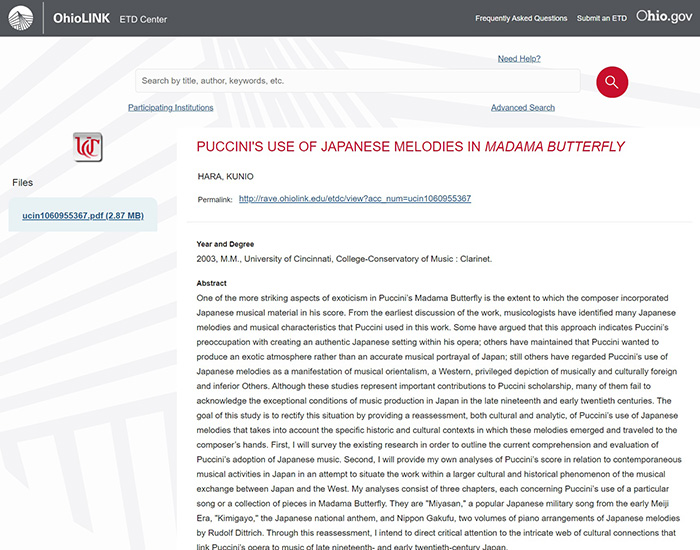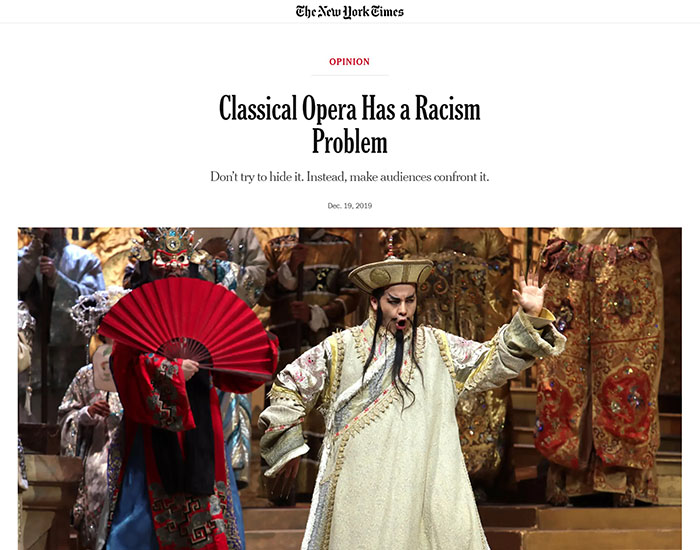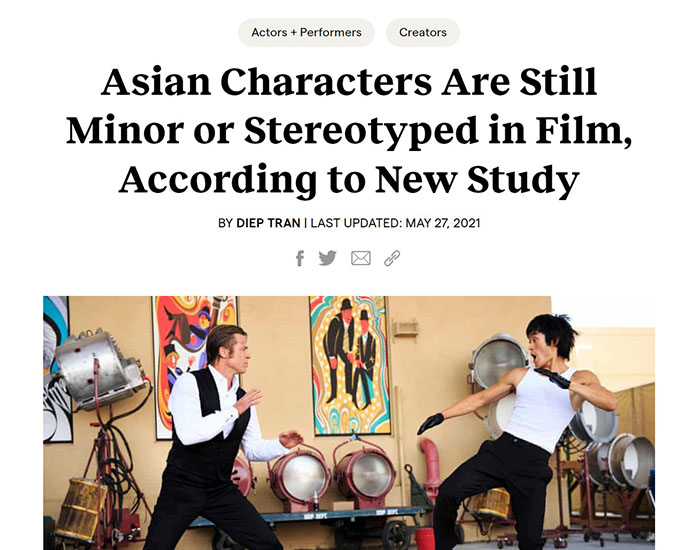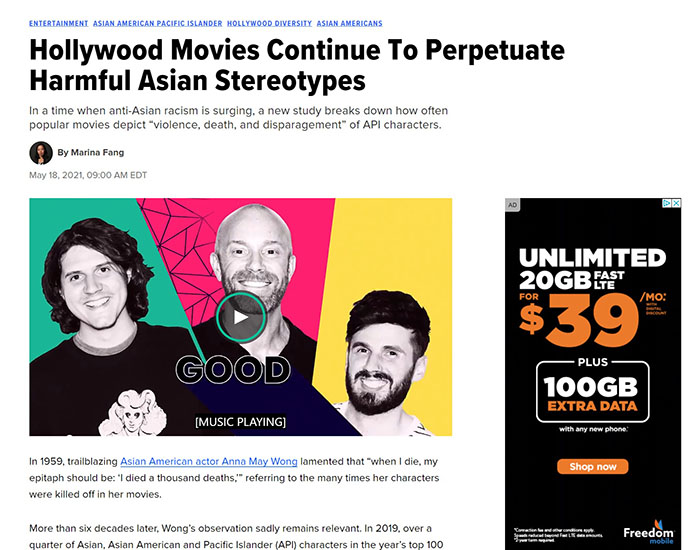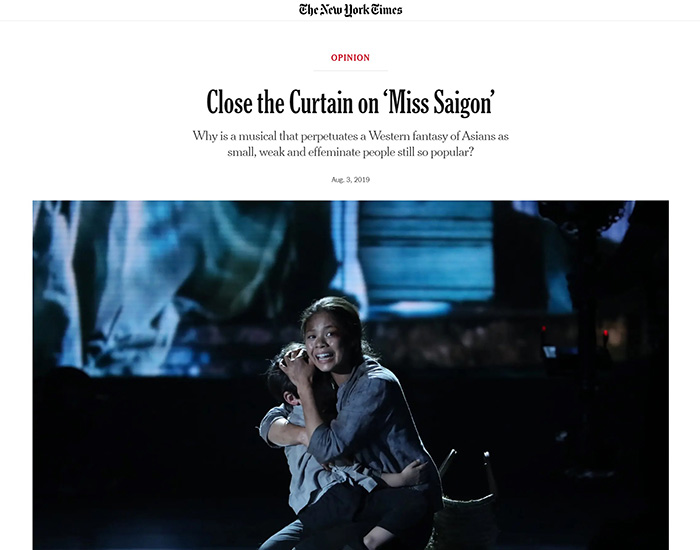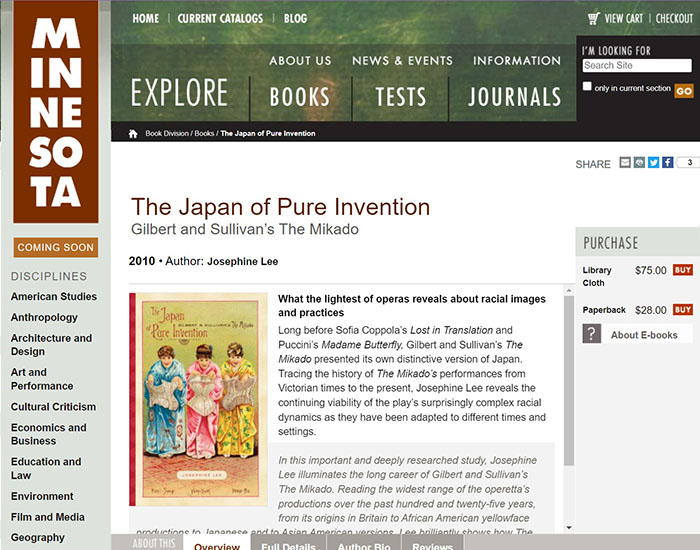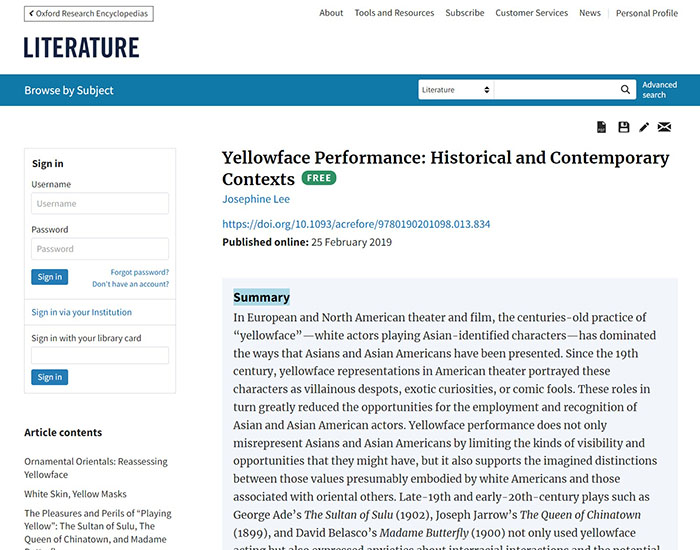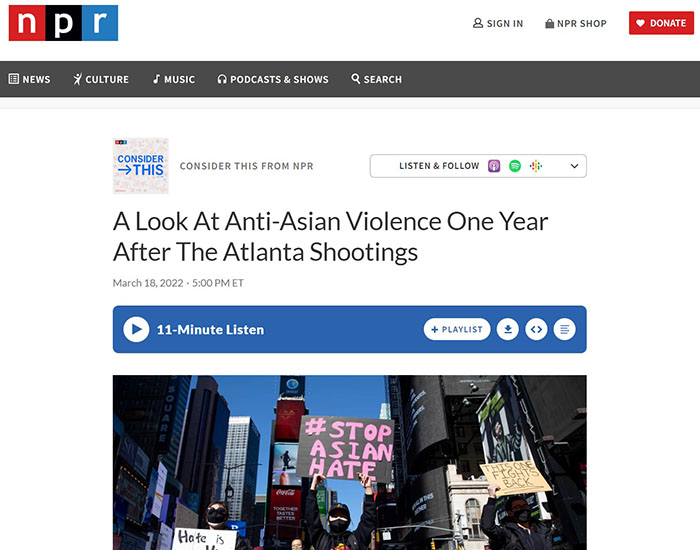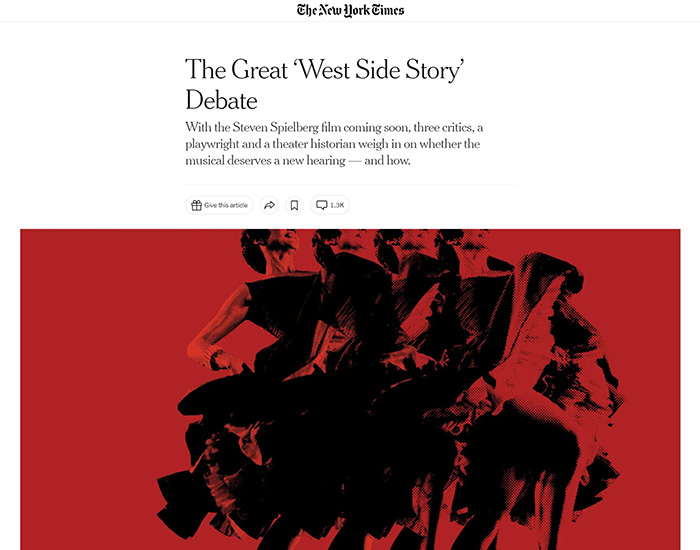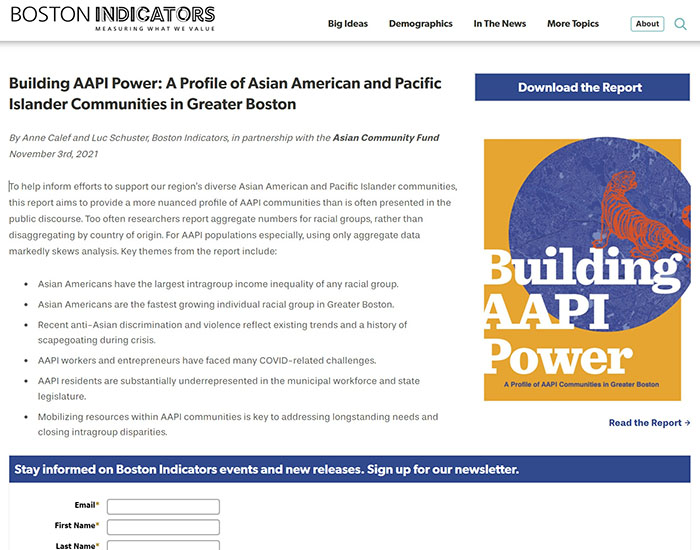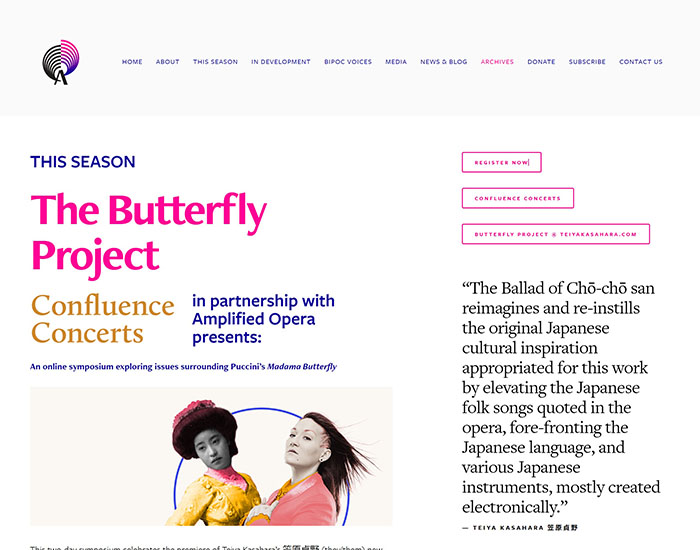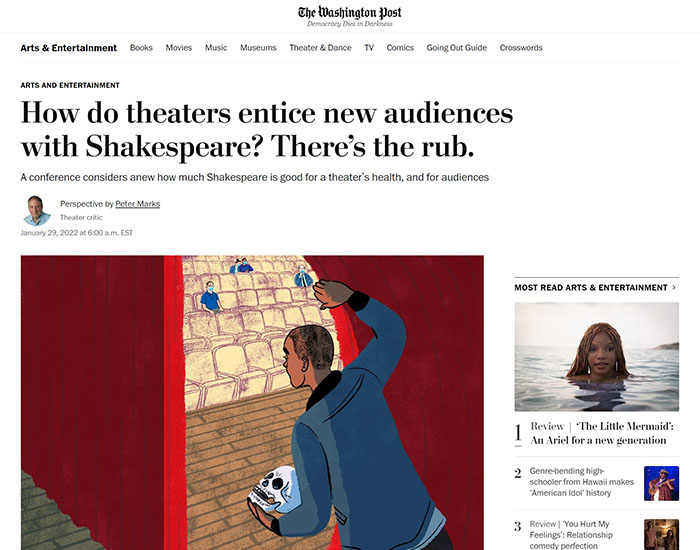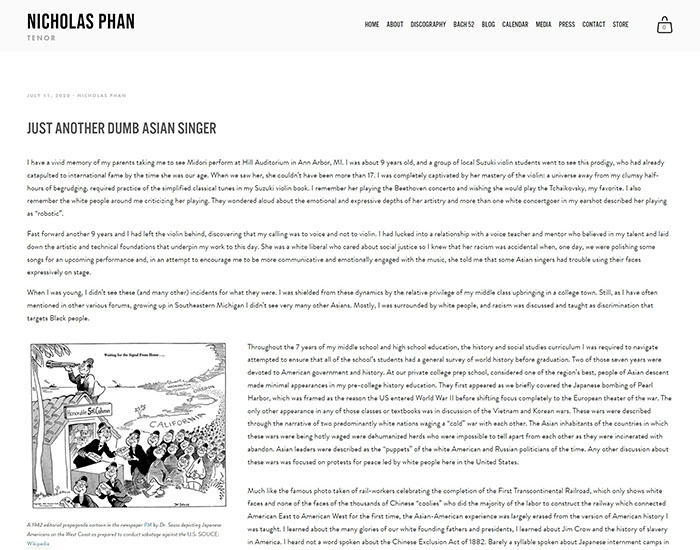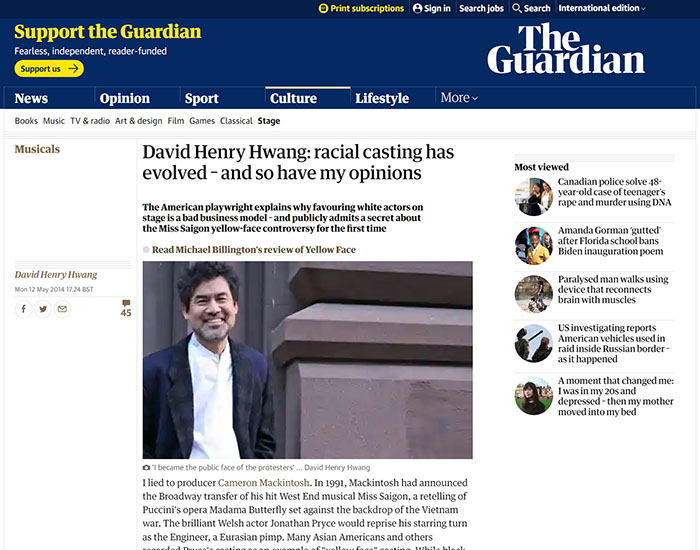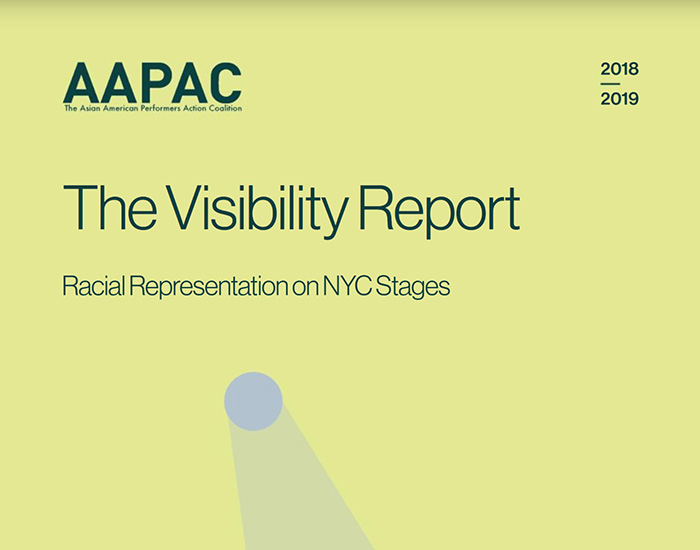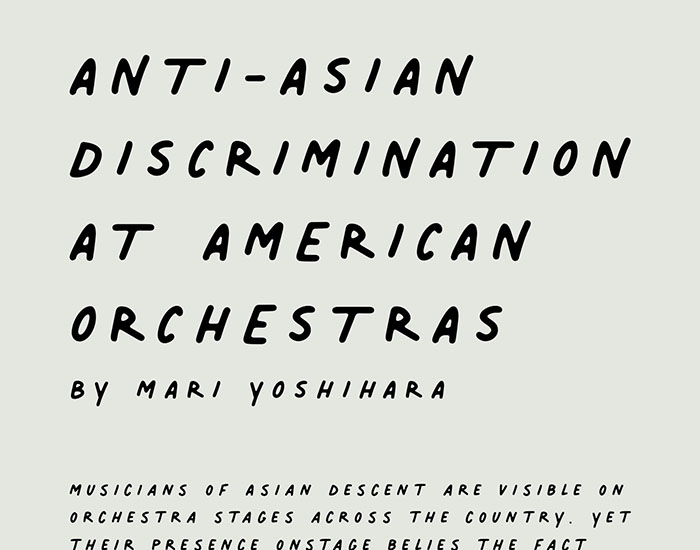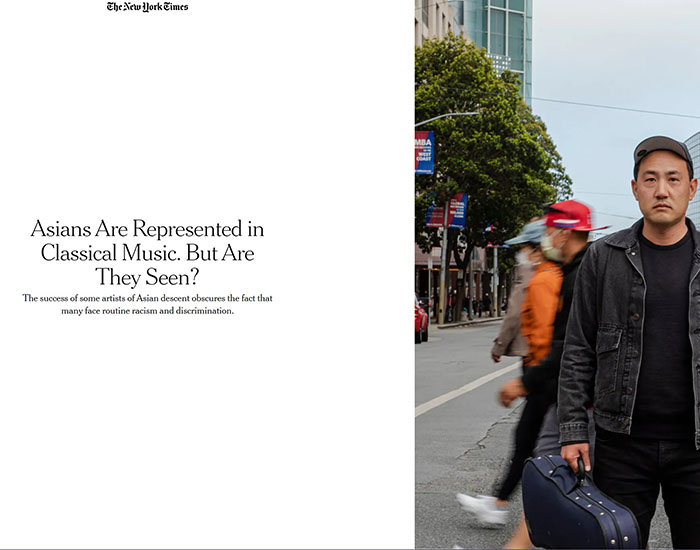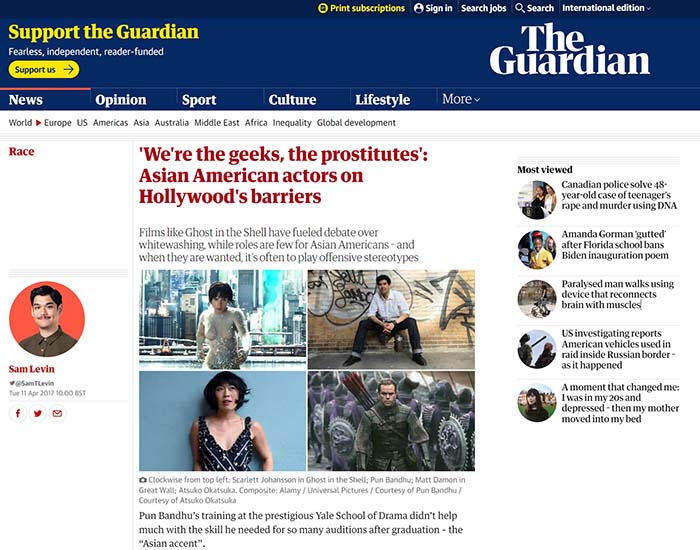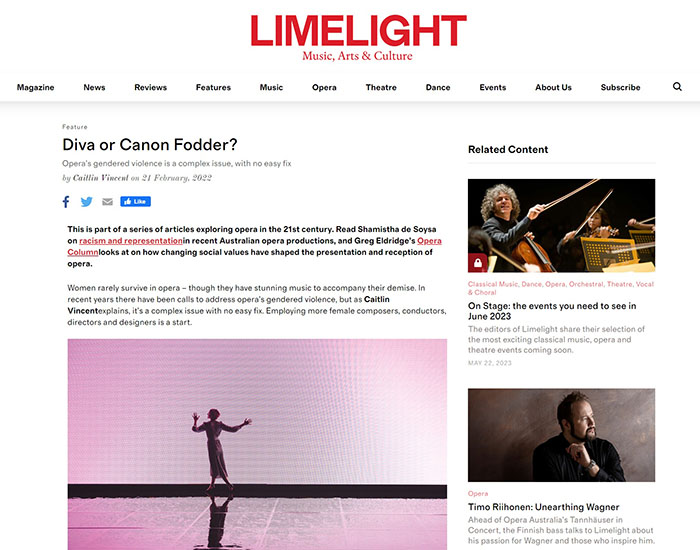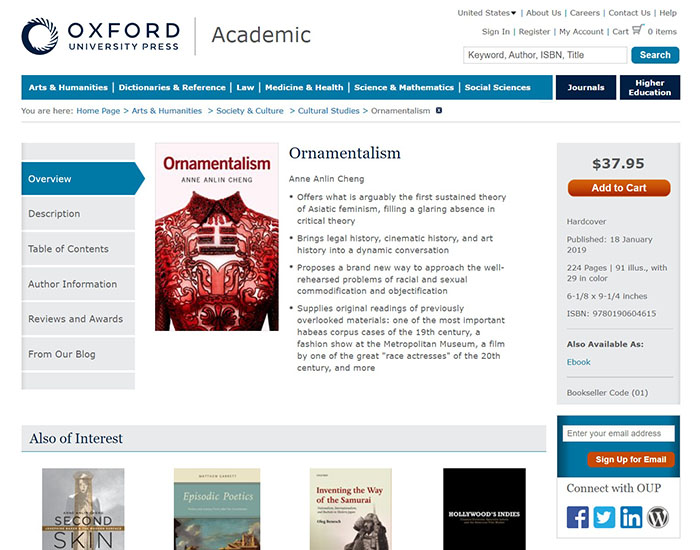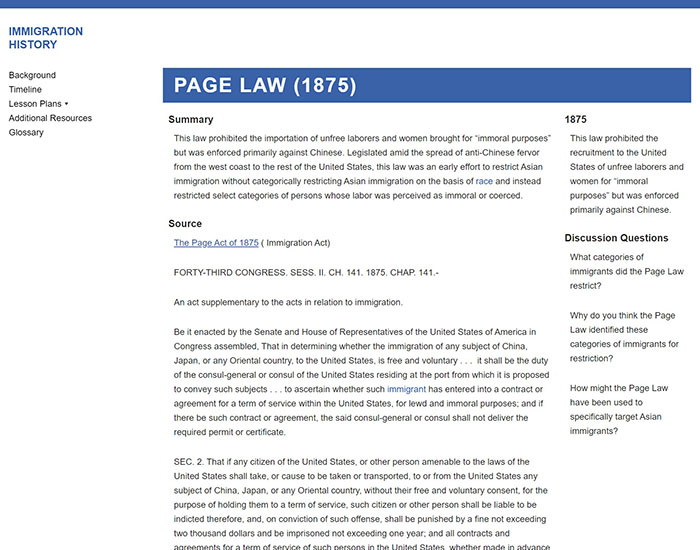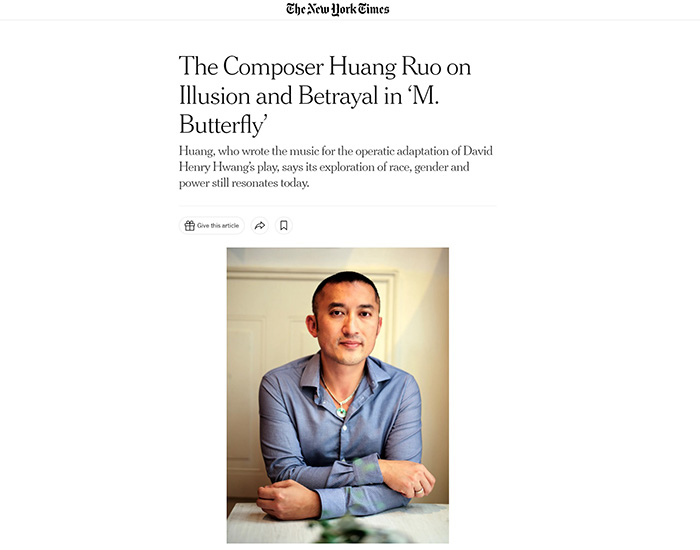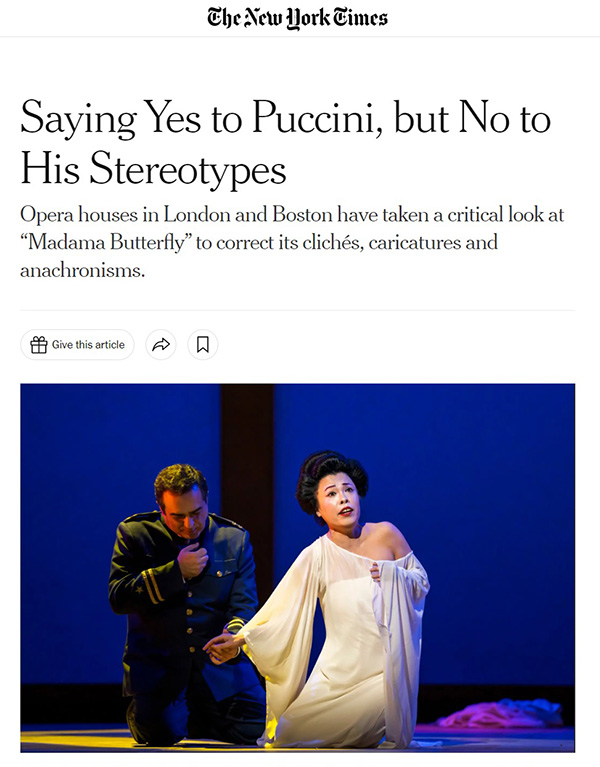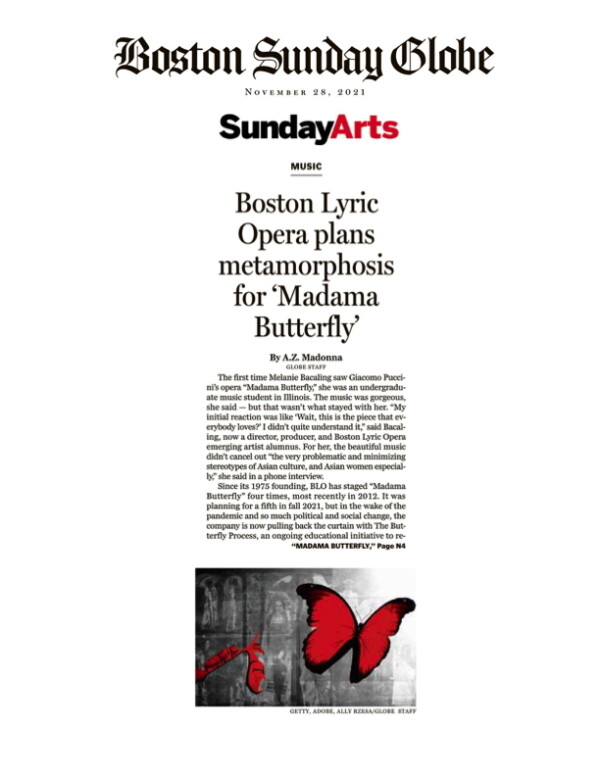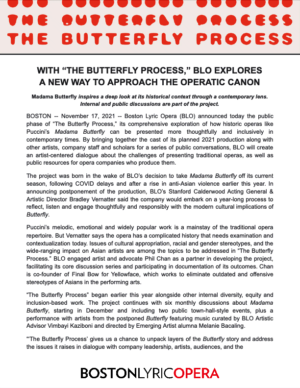The Butterfly Process is part of BLO’s commitment to authentic storytelling with its artists and for its audiences that informs a new approach to presenting canonical operas today.
“The goal here is for everyone to participate in an art form that hasn’t traditionally been inclusive, and to strengthen our communities and audiences through the music and stories we present. I believe we can do it by engaging with and listening to people of many backgrounds and life experiences and incorporating that into our work.”
– Bradley Vernatter, “Saying Yes to Puccini, but No to His Stereotypes” – The New York Times
BLO is presenting our new production of Madama Butterfly Sept 14-24. Learn more here, and purchase tickets below.
ABOUT THE BUTTERFLY PROCESS
Spurred by a postponed production of Puccini’s Madama Butterfly for Boston Lyric Opera’s 2020/21 Season BLO began conversations with Butterfly artists, staff, and community aiming to reexamine the history and legacy of this opera in light of ongoing uncertainty of returning to live performances during the ongoing pandemic alongside heightened racism toward Asian communities.
While Madama Butterfly is loved by audiences and remains an essential part of the traditional repertoire, the opera’s history has reputation for portraying inaccurate, harmful representations of Japanese culture, contributing to stereotypes of Asian and Asian-Americans. BLO engaged with artists, board members, community leaders, organizations, and preeminent scholars to discuss Madama Butterfly, particularly around the areas of cultural appropriation, race, and gender stereotypes—and the wide-ranging impact of this opera for Asian artists.
This became known as The Butterfly Process, BLO’s commitment to unpacking the layers of this story and the historical context of the work— and how to incorporate its legacy in a way that celebrates opera as a multicultural art form.
BLO hosted six public discussions throughout the 2021/22 Season, hosted and moderated by Phil Chan, co-founder and author of Final Bow for Yellowface, who also served as a partner in developing and facilitating this series. These discussions explore issues tied to the historical impact and current producing realities of Madama Butterfly. Though conversation with featured speakers and members of BLO’s previously planned Butterfly cast, Phil guides each conversation with to contextualize each theme and frame a community discussion. We invite you to explore these conversations below.
The Birth of Butterfly through WWII: The First 50 Years focuses on the essential questions to ground us in the work of Madama Butterfly, including the socio-political context during the time of its premiere and how that changed during and after World War II. Dr. Kunio Hara, a preeminent Puccini scholar is in diologue with Phil Chan and BLO artists to contextualize these themes to frame a community discussion.
Featured Speaker Kunio Hara
Orientalism & Cultural Appropriation focuses on learning and engaging with how Orientalism has influenced Western European Art and by extension, how Eurocentric art—and Madama Butterfly specifically—has defined, perpetuated, and reinforced particular and narrow attitudes about AAPI people and cultures
Featured Speakers Mari Yoshihara, Michael Sakamoto, Josephine Lee, Huang Ruo
The Impact on Artists & Audiences centers the experience of opera artists and explores the complex, sometimes conflicting relationship many have to Madama Butterfly, both as a gateway to opera and a work that has typecast many AAPI singers. Artists will explore ways in which opera productions can be more inclusive and multicultural. Phil Chan guides a conversation in a Town Hall format hosted by the Boston Public Library as part of their Racial Equity and Recovery Initiative.
Featured Speakers Melanie Bacaling, Eiji Miura, Todd McNeel Jr., Wynne Szeto
Symbolism & Archetypes of Women explores the cultural context of geisha in Japan as it relates to the character of Cio–Cio-San in Madama Butterfly, and how depictions of this character have perpetuated sexualized stereotypes of Asian and AAPI women in American culture.
Featured Speakers Teiya Kasahara, Yunah Lee, and Giselle Ty
The Casting the Roles discussion session unpacks the nuances within ongoing industry conversations about appropriate casting and performance practices. Constructive dialogue explores culturally sensitive, inclusive, and responsive practices that center the story being told, who is telling the story, and who makes up the audience.
Featured Speakers Priti Gandhi, David Henry Hwang, Benjamin Makino, Douglas Sumi
Learning & Sharing we share with our community and the industry what we learned and where we are going from here—both specifically for the opera Madama Butterfly and more broadly, outlining action and steps BLO is taking to become a multiracial opera company. Phil Chan will lead the conversation with BLO leaders, leadership from New Orleans Opera, a partner in this discussion series, and artists to reflect and respond to this process. This wrap-up be live streamed from Boston Lyric Opera’s space at the Midway Artist Studios in Fort Point and the audience will be able to attend virtually.
With Jessica Johnson Brock, Clare Burovac, Anne M. Morgan, Nina Yoshida Nelson, and Bradley Vernatter
Re-orienting Madama Butterfly: From the “white gaze” to inclusive opera
About twenty years ago, I attended a production of Madama Butterfly at San Francisco Opera. Even now, I recall the state of cognitive dissonance I experienced as an audience member. I wanted to immerse myself in the voices of the opera singers and in the visually stunning set design, but couldn’t shake my discomfort with the representation of the Japanese characters. As one of the only Asian audience members, I felt self-conscious and complicit with the racial stereotyping I witnessed. Madama Butterfly is the sixth most performed opera in the world and has occupied a position of privilege within [...]
Cio-Cio-San at War: Madama Butterfly, World War II, and the Japanese American Experience
On December 2, 1944, a newspaper from Cody, Wyoming published a small notice about a performance of Puccini’s Madama Butterfly at the Brooklyn Academy of Music the previous week. Oddly, the unsigned article does not contain any description of the performance itself. Instead, it dwells on the decision of the company’s director, Alfredo Salmaggi, to mount the opera, which had not been performed in New York City since the Japanese attack on Pearl Harbor on December 7, 1941. The article reports that Salmaggi had received “several letters of protests from relatives of service men” but also reminds that he [...]
The Geisha in the Mirror: The Impact of Symbols and Archetypes
Since the dawn of time, theatrical creatives have coaxed audiences out of reality and into fantastic worlds with gripping stories through the magic of stagecraft. In order to help the audience suspend their disbelief and get caught up in a story, theater-makers use symbols that represent the real world. A symbol is something that stands in for something else in the real world. A symbol can be a flag that represents a nation, or a stoplight that is a stand-in for commands, or a dove that represents peace. On stage, a costume is a great symbol that helps give you [...]
Resonant Voices: An Interview with Cerise Lim Jacobs
Opera creatives face the perennial challenge of pushing the art form forward and making it resonate with new audiences. Companies can approach this challenge using three different strategies. The first and most common strategy is to present European canonic operas but change the original setting. This challenges the original form and simultaneously brings new truths inherent in the work that might be more relevant to a contemporary audience. Examples include Calixto Bieito’s Carmen set in late 1970s Spain and the Metropolitan Opera’s recent Rigoletto, set in 1940s Las Vegas. Shakespeare’s plays, written over 400 years ago, are often set in [...]
Voicing Quietness: Madama Butterfly and the Perception of East Asian Women
“We keep our heads down and work hard, believing that our diligence will reward us with our dignity, but our diligence will only make us disappear. By not speaking up, we perpetuate the myth that our shame is caused by our repressive culture and the country we fled, whereas America has given us nothing but opportunity.” -Cathy Park Hong, Minor Feelings: An Asian American Reckoning In a sound world dominated by high Cs and virtuosic coloratura runs, qualities such as volume, presence, and dimensionality are prized in a voice. The entrance of the leading lady of the opera is applauded; [...]
For the Community: The Perspectives of Artists and Audience
How many variations of the fairytale, Cinderella , can you name? There’s Rhodopis from ancient Greece, Ye Xian from ancient China, Perrault’s Cendrillon and Walt Disney’s Cinderella , to name a few . This familiar rags-to-riches story has inspired each generation to find a new “twist” in the story to make it resonate with their local audience. With its multicultural history, it’s easy to continue to adapt a story like Cinderella, which has undergone many variations over time, yet somehow still manages to hold its plot and structure. However, it is a much greater challenge to reimagine a work, like [...]
Diving Deeper: A Dialogue about Orientalism
In our previous Butterfly Process session with Dr. Kunio Hara, we gained insightful historical context about the genesis of Madama Butterfly, as well as tracing its performance history through the evolving social and geopolitical conditions to the present day. This second session unpacked Orientalism and Cultural Appropriation which are two very significant topics that play a heavy hand in understanding the dynamics at play with why Madama Butterfly can often be problematic. To tackle the conversation from multiple perspectives, BLO invited a panel of academics, artists, and presenters to show historical and scholarly context alongside real feedback from creatives in [...]
Contextualizing Butterfly
Contextualizing Butterfly Welcome to The Butterfly Process blog! My name is Phil Chan, I am the cofounder of Final Bow for Yellowface and since 2017, we have been working to improve how to represent Asians on the stage (yes, we are the folks who de-yellowfaced The Nutcracker). Though my work has primarily been ballet, I am a self-professed opera queen. So, I was intrigued when BLO invited me to lead a year-long conversation around the issues raised when producing Giacomo Puccini’s Madama Butterfly, a work I love but have always been slightly uncomfortable with. As my creative practice consists [...]
Amplified Opera’s The Butterfly Project
Amplified Opera, in partnership with Confluence Concerts, recently hosted on online symposium tackling the issues Madama Butterfly presents. For further conversations around these issues, be sure to watch the symposium.
Our Story: Cultural Legacies of Japanese Incarceration
Join Japanese American artists, scholars, and advocates for a discussion about the lasting cultural legacy of the United States’ forced mass removal and incarceration of Japanese Americans during World War II. Watch Now.
Puccini’s Use of Japanese Melodies in Madama Butterfly (M.M. thesis, University of Cincinnati)
Classical Opera Has a Racism Problem (The New York Times)
Hollywood Movies Continue To Perpetuate Harmful Asian Stereotypes (The Huffington Post)
Close the Curtain on ‘Miss Saigon’ (The New York Times)
The Japan of Pure Invention: Gilbert and Sllivan’s Mikado (University of Minnesota Press)
Yellowface Performance: Historical and Contemporary Contexts (Oxford Research Encyclopedia of Literature)
The Great ‘West Side Story’ Debate (The New York Times)
The Butterfly Project: The Ballad of Chō-Chō San (Amplified Opera)
Unpacking the Model Minority Myth: How Do You Solve a Problem Like Mikado? (Intermountain Opera Bozeman and the Bozeman Public Library)
Microaggressions: How Do You Solve A Problem Like Mikado? (Intermountain Opera Bozeman and the Bozeman Public Library)
ASIA Panel: How Do You Solve A Problem Like Mikado? (Intermountain Opera Bozeman and the Bozeman Public Library)
AOA Panel: How Do You Solve A Problem Like Mikado? (Intermountain Opera Bozeman and the Bozeman Public Library)
How do theaters entice new audiences with Shakespeare? There’s the rub. (The Washington Post)
JUST ANOTHER DUMB ASIAN SINGER (Nicholas Phan, blog post)
Decolonizing the Music Room (Decolonizing the Music Room)
The Visibility Report (AAPAC)
Anti-Asian Discrimination at American Orchestras (Americanorchestras.org)
Asians Are Represented in Classical Music. But Are They Seen? (The New York Times)
Ornamentalism (Limelight)
Ornamentalism (Oxford University Press)
The Page Law of 1875 (Immigration History)
‘Grappling with Madama Butterfly Today: Representation, Reclamation, Re-imagination (Amplified Opera, Canadian Opera Company, Confluence Concerts)
The Butterfly Project: The Ballad of Chō-Chō San (Confluence Concerts)
The Composer Huang Ruo on Illusion and Betrayal in ‘M. Butterfly’ (The New York Times)

Phil Chan
Phil Chan
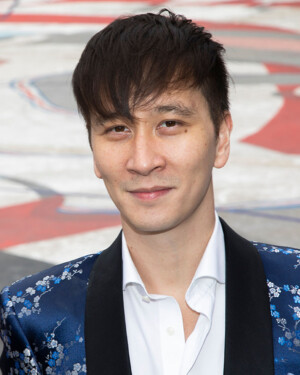 Phil Chan is the co-founder of Final Bow for Yellowface, and author of Final Bow for Yellowface: Dancing between Intention and Impact. He is currently a 2021/22 Visiting Scholar at the A/P/A Institute at NYU and the Manhattan School of Music’s 2021/22 Citizen Artist. He is a graduate of Carleton College and an alumnus of the Ailey School. As a writer, he served as the Executive Editor for FLATT Magazine and contributed to Dance Europe Magazine, Dance Magazine, Dance Business Weekly, and The Huffington Post. He was the founding General Manager of the Buck Hill Skytop Music Festival and was the General Manager of Armitage Gone! Dance. He served multiple years on the National Endowment for the Arts dance panel and the Jadin Wong Award panel presented by the Asian American Arts Alliance. He serves on the International Council for the Parsons Dance Company, the Advisory Board of Dance Magazine, and was a 2020 New York Public Library Jerome Robbins Dance Division Research Fellow. His next project, the “Ballet des Porcelaines,” will premiere at the Metropolitan Museum of Art in December 2021.
Phil Chan is the co-founder of Final Bow for Yellowface, and author of Final Bow for Yellowface: Dancing between Intention and Impact. He is currently a 2021/22 Visiting Scholar at the A/P/A Institute at NYU and the Manhattan School of Music’s 2021/22 Citizen Artist. He is a graduate of Carleton College and an alumnus of the Ailey School. As a writer, he served as the Executive Editor for FLATT Magazine and contributed to Dance Europe Magazine, Dance Magazine, Dance Business Weekly, and The Huffington Post. He was the founding General Manager of the Buck Hill Skytop Music Festival and was the General Manager of Armitage Gone! Dance. He served multiple years on the National Endowment for the Arts dance panel and the Jadin Wong Award panel presented by the Asian American Arts Alliance. He serves on the International Council for the Parsons Dance Company, the Advisory Board of Dance Magazine, and was a 2020 New York Public Library Jerome Robbins Dance Division Research Fellow. His next project, the “Ballet des Porcelaines,” will premiere at the Metropolitan Museum of Art in December 2021.

Melanie Bacaling
Melanie Bacaling
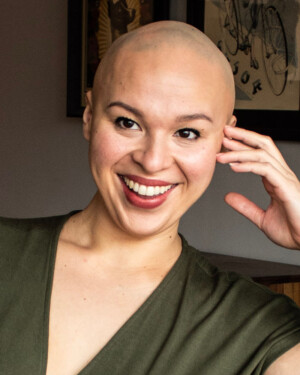
Originally from Chicago, IL, Melanie Bacaling (she/her) is an active director, producer, and stage manager in the opera industry. She is currently the Associate Artistic Director for the Opera Omaha’s ONE Studio where she also served as the founding Co-Curator and Directing Producer of the Amplifying the Black Experience series with soprano Chabrelle Williams. With Boston Lyric Opera, Ms. Bacaling was named an Emerging Artist and later the Company Artist Advocate. Recent engagements with BLO include producing We Need to Listen, a series of conversations highlighting the racial inequities that exist in classical music and opera, and she curated and produced BLO’s podcast at its (s)core, which seeks to delve into the inner workings of the opera industry and highlight voices of the BIPOC and LGBTQIA communities. Upcoming engagements include Assistant Directing Fire Shut Up in My Bones with Lyric Opera Chicago and X: The Life and Times of Malcolm X with Michigan Opera Theater. This summer she will return to the Santa Fe Opera staging staff for Carmen and the world premiere of Huang Ruo and David Henry Hwang’s M. Butterfly. In the 23/24 season, Ms. Bacaling will make her debut on the directing staff at the Met.

Allison Chu
Allison Chu
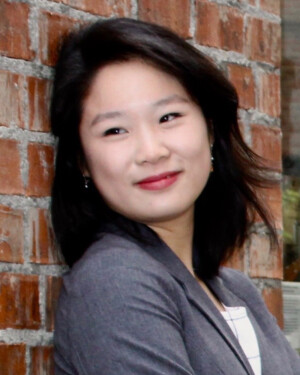
Allison Chu is pursuing her Ph.D. in Music History at Yale University, with research interests in American opera in the twentieth and twenty-first centuries, contemporary classical music, and representations of identity on and off the stage. She holds a Bachelor of Music in Clarinet Performance (2019) and a Bachelor of Arts in English (2019) from the University of Michigan. From 2017 to 2019, she worked with the University of Michigan Gershwin Initiative as an Editorial Assistant. As an undergraduate student, Ms. Chu was awarded a University of Michigan EXCEL Enterprise Fund grant to research blackface minstrelsy, the representation of Black cultural life, and genre hybridity in George Gershwin’s Blue Monday. Ms. Chu n is one of the founding members and current co-chair of the Grant Hagan Society, a graduate student-led affinity group that supports people of color in the Yale Department of Music. She is invested in bridging the gap between performers and scholars, practicing public musicology through engagements such as her position as guest lecturer for the 2020 Lakes Area Music Festival and the 2021 Connecticut SummerFest, and as one of the founding members of the Midnight Oil Collective.

Priti Gandhi
Priti Gandhi
 Priti Gandhi joined Portland Opera in the fall of 2021 as an artistic and strategic leader, as part of a new collaborative leadership team structure for the company. Her role leads the discussions for season planning, casting, developing the young artist program, and oversight of the company’s community engagement and educational programs.
Priti Gandhi joined Portland Opera in the fall of 2021 as an artistic and strategic leader, as part of a new collaborative leadership team structure for the company. Her role leads the discussions for season planning, casting, developing the young artist program, and oversight of the company’s community engagement and educational programs.
Previous to her post in Portland, she was Vice President of Artistic at Minnesota Opera, where she advised on topics related to company programming, casting, and commissions related to the New Works Initiative. She also created new processes for company-wide conversations regarding diversity in traditional narratives and casting – most notably, exploring the growing discussion of the relevance of the operatic canon in the evolving lens of today. Ms. Gandhi has also served on a number of advisory panels regarding grants and commissions for new work relating to BIPOC stories, including Arts Midwest, IDEA grants with Opera America, and American Lyric Theater.
Ms. Gandhi graduated with a BA in communications and a minor in theatre from the University of California, San Diego. An alumna of programs at Cleveland Opera and San Diego Opera, Ms. Gandhi is also an amateur painter and flamenco dancer.

Kunio Hara
Kunio Hara
 Kunio Hara is an associate professor of music history at the University of South Carolina. His research interests include Puccini’s operas, exoticism and Orientalism in music, nostalgia, and music in postwar Japan. Dr. Hara has presented papers at various national and international musicological and interdisciplinary conferences including the meetings of the American Musicological Society, The Society for American Music, Transnational Opera Studies Conference, and Music and the Moving Image Conference. His published works include articles “‘Per noi emigrati’: Nostalgia in the Reception of Puccini’s La fanciulla del West in New York City’s Italian-Language Newspapers” in the Journal of the Society for American Music; “The Death of Tamaki Miura: Performing Madama Butterfly During the Allied Occupation of Japan” in Music and Politics, “1 + 1 = 1: Measuring Time’s Distance in Tōru Takemitsu’s Nostalghia: In Memory of Andrei Tarkovskij” in Music and the Moving Image, “Rudolf Dittrich’s Nippon Gakufu and Giacomo Puccini’s Madama Butterfly” in Music Research Forum, and “The Structure of Nostalgia in Puccini’s Operas” in Between Nostalgia, Utopia, and Realities. He is also the author of the forthcoming book Joe Hisaishi’s Soundtrack for My Neighbor Totoro as part of the Bloomsbury’s 33 1/3 Japan Series. Dr. Hara holds a Ph.D. in musicology from Indiana University Jacobs School of Music and M.M. and B.M. degrees in music history and clarinet performance from the University of Cincinnati College-Conservatory of Music.
Kunio Hara is an associate professor of music history at the University of South Carolina. His research interests include Puccini’s operas, exoticism and Orientalism in music, nostalgia, and music in postwar Japan. Dr. Hara has presented papers at various national and international musicological and interdisciplinary conferences including the meetings of the American Musicological Society, The Society for American Music, Transnational Opera Studies Conference, and Music and the Moving Image Conference. His published works include articles “‘Per noi emigrati’: Nostalgia in the Reception of Puccini’s La fanciulla del West in New York City’s Italian-Language Newspapers” in the Journal of the Society for American Music; “The Death of Tamaki Miura: Performing Madama Butterfly During the Allied Occupation of Japan” in Music and Politics, “1 + 1 = 1: Measuring Time’s Distance in Tōru Takemitsu’s Nostalghia: In Memory of Andrei Tarkovskij” in Music and the Moving Image, “Rudolf Dittrich’s Nippon Gakufu and Giacomo Puccini’s Madama Butterfly” in Music Research Forum, and “The Structure of Nostalgia in Puccini’s Operas” in Between Nostalgia, Utopia, and Realities. He is also the author of the forthcoming book Joe Hisaishi’s Soundtrack for My Neighbor Totoro as part of the Bloomsbury’s 33 1/3 Japan Series. Dr. Hara holds a Ph.D. in musicology from Indiana University Jacobs School of Music and M.M. and B.M. degrees in music history and clarinet performance from the University of Cincinnati College-Conservatory of Music.

David Henry Hwang
David Henry Hwang
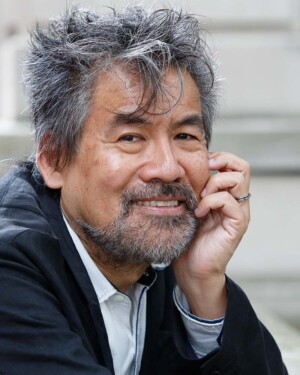
David Henry Hwang’s work includes the plays M. Butterfly, Chinglish, Yellow Face, Golden Child, The Dance and the Railroad, and FOB, as well as the Broadway musicals Aida, Flower Drum Song (2002 revival) and Disney’s Tarzan. His screenplays include M. Butterfly and he is penning the live-action feature musical remake of Disney’s The Hunchback of Notre Dame. Hwang is a Tony Award winner and three-time nominee, a Grammy Award winner and two-time nominee, and a three-time Finalist for the Pulitzer Prize in Drama.
Called America’s most-produced living opera librettist by Opera News, he has written thirteen operas to date, including five works with Philip Glass. Hwang has also worked with composers Bright Sheng, Unsuk Chin, and Howard Shore and he is a Grammy Award winner for Ainadamar with music by Osvaldo Golijov. His operas with composer Huang Ruo include An American Soldier (Washington National Opera and Opera Theatre of St. Louis), The Rift (WNO, 2022) and their adaptation of M. Butterfly (Santa Fe Opera, upcoming 2022).
His latest musical, Soft Power, written with composer Jeanine Tesori, received four Outer Critics Honors, a Grammy nomination, and was a Finalist for the 2020 Pulitzer Prize.

Teiya Kasahara
Teiya Kasahara

Nikkei-Canadian settler Teiya Kasahara 笠原 貞野 (they/them) is a queer, trans non-binary, interdisciplinary creator-performer based in Tkarón:to (Toronto), most recently featured in a CBC short-doc OPERA TRANS*FORMED. Teiya comes from a background of over a decade of singing both traditional and contemporary operatic and concert roles such as the Lady Macbeth/MACBETH (Opera Niagara), MADAMA BUTTERFLY (Windsor Symphony), and the 2020 video of ELECTRIC MESSIAH (Soundstreams).Teiya is also a co-founder of Amplified Opera (AO and is also the Canadian Opera Company’s Disruptor-in-Residence since 2021. Within their own artistic practice, Teiya explores the intersections of gender, sexuality, and race through their original works (夜 YORU, or WHEN THE NIGHT BECOMES ONE SOUND) and this season is creating a new work LITTLE MIS(S)GENDER as the 2021-2022 artist-in-residence at the Mark S. Bonham Centre for Sexual Diversity Studies at the University of Toronto. Upcoming is the soprano solo in Beethoven’s 9th Symphony with the Vancouver Symphony Orchestra and the world premiere of their original work THE QUEEN IN ME at the Canadian Opera Company.

Josephine Lee
Josephine Lee

Josephine Lee is a professor of English and Asian American Studies at the University of Minnesota and the editor in chief of the Oxford Encyclopedia of Asian American Literature and Culture. Her other books include Oriental, Black, and White: The Formation of Racial Habits in American Theater, The Japan of Pure Invention: Gilbert and Sullivan’s The Mikado, and Performing Asian America: Race and Ethnicity on the Contemporary Stage. She has received a Leadership Award from the Council on Asian Pacific Minnesotans and a Lifetime Achievement Award from the Association for Asian American Studies. At the University of Minnesota, she received the University of Minnesota’s Award for Outstanding Contributions to Postbaccalaureate, Graduate, and Professional Education and the Horace T. Morse-Alumni Award for Outstanding Contributions to Undergraduate Education. She has also been the recipient of a Leadership Award from the Council on Asian Pacific Minnesotans and a Lifetime Achievement Award from the Association for Asian American Studies.

Yunah Lee
Yunah Lee
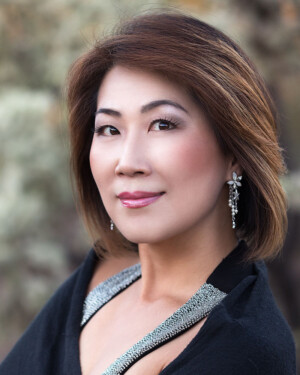
Korean American lyric Soprano Yunah Lee is known internationally for her signature role as Madama Butterfly, having performed the role of Cio Cio San more than 170 times with opera theaters. Recently, she made her role debuts in the title role in Dvořák’s opera Rusalka with the Korea National Opera, and the role of Tatyana in Eugene Onegin with the Seoul Philharmonic Orchestra. As an active concert singer, Ms. Lee has sung Handel’s Messiah, Mozart’s Requiem, Haydn’s The Creation and Bach’s St. Matthew Passion with the New York Oratorio Society at Carnegie Hall, and Verdi’s Requiem with National Chorale at Avery Fisher Hall. Ms. Lee also performed in Mahler’s Symphony 2 with the Hiroshima Symphony in Hiroshima for a special concert commemorating the 60th anniversary of the atomic bomb blast. Ms. Lee’s first recording of “Four Seasons in Korea” with I Musici was released on Arcadia label. Her other recording credits include performances of songs by Paul Salerni on Albany records. Ms. Lee received her musical and operatic training from New York’s Juilliard School and The Juilliard Opera Center after receiving a Bachelor of Music degree music from Hanyang University in Seoul, Korea.

Benjamin Makino
Benjamin Makino
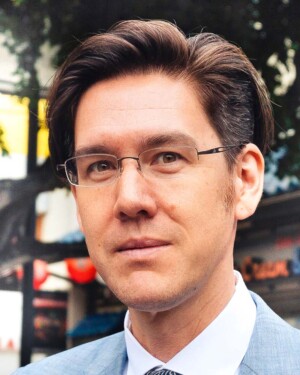 Conductor Benjamin Makino has been recognized for his nuanced and thoughtful interpretations of broad and varied repertoire.
Conductor Benjamin Makino has been recognized for his nuanced and thoughtful interpretations of broad and varied repertoire.
His work has been affiliated with some of the companies most recognized for innovation in the United States. Following the success of the first 30 Days of Opera, Makino was named Music Director of Opera Memphis. During his tenure the company was praised for its innovative community engagement programs, experimentation, and groundbreaking commissioning projects.
Prior to joining Opera Memphis he was the Assistant Conductor and Chorus Master at Long Beach Opera, where he conducted several productions including the US premieres of Gavin Bryars’ The Paper Nautilus and Stewart Copeland’s Tell-Tale Heart. He recently returned to the company in Frank Martin’s The Love Potion (Le vin herbé) for which he was praised in the Los Angeles Times for being “consistently sensitive to the work’s exquisite timing and placement of dynamics and color,” making “the most of the composer’s subtle chamber orchestra textures.”
He currently lives in Porterville, California with his wife, Sarah Rector, who heads the music program at Porterville College, and where he is an adjunct faculty member, teaching surveys of classical music of the nineteenth century through today.

Todd McNeel
Todd McNeel

Todd McNeel, Jr recently graduated with his Master’s in Communications Management from Emerson College. He currently serves as the Senior Manager of Marketing and Communications at Boston Lyric Opera, where he leads all marketing, communications, and advertising strategies and initiatives. When he is not working on brand management campaigns, you can catch him on stage performing with regional opera and theatre companies nationwide. He is an Emerging Talent Award recipient of the Kurt Weill – Lotte Lenya Competition and has been praised by Theatre Mirror for his “tower of strength” presence and “powerful voice.” Prior to Boston Lyric Opera, Todd worked in Media and Publishing with Boston, Philadelphia, and Atlanta Magazines. He also has served as a marketing and PR Manager for Boston performing arts institutions such as ArtsEmerson and Longy School of Music. In the very little free time he has, Todd also works as a freelance wedding and events photographer. His work has been published in multiple social media and online campaigns with Jam Jar Wines, the BBC, Boston University, London’s Theatre Trip, the Dallas News, WGBH, and many more. Todd holds a bachelor’s degree in Mass Communications from Ouachita Baptist University and attended Longy School of Music for his graduate studies in Opera Performance.

Eiji Miura
Eiji Miura
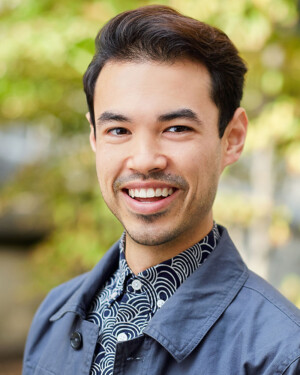
Japanese American tenor Eiji Miura is an active and sought-after Boston-based singer and educator. Miura joined the Boston Conservatory at Berklee voice faculty in 2018 and is the managing director of the Boston Conservatory Opera Intensive at Valencia. In addition to his appointment at the conservatory, he currently serves on the faculties of the Berklee College of Music, the Massachusetts Institute of Technology (MIT), and is a guest teaching artists at the Longy School of Music of Bard College for the 2021-22 academic year, where he has been invited to lecture on and coach Japanese art song. As a performer, Miura has performed with companies such as Odyssey Opera and Boston Modern Orchestra Project, held residencies at cathedrals throughout England, and performed the role of Goro in the world’s first true-to-story Japanese-English bilingual production of Puccini’s Madama Butterfly with Pacific Opera Project and Opera in the Heights. In addition to an M.M. in vocal performance and pedagogy from the Boston Conservatory, Miura holds an M.Sc. in communications and a double B.A. in Asian studies and vocal performance from Clark University.

Huang Ruo
Huang Ruo
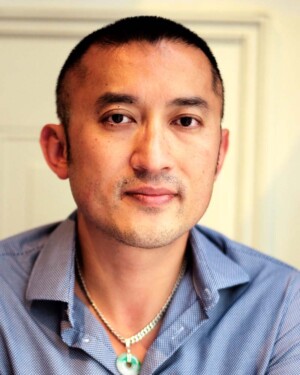
Huang Ruo has been lauded by The New York Times for having “a distinctive style.” His vibrant and inventive musical voice draws equal inspiration from Chinese ancient and folk music, Western avant-garde, experimental, noise, natural and processed sound, rock, and jazz to create a seamless, organic integration using a compositional technique he calls “Dimensionalism.” His music has been premiered and performed by the New York Philharmonic, Philadelphia Orchestra, Boston Symphony Orchestra, San Francisco Symphony, BBC Symphony Orchestra, Netherlands Radio Philharmonic, National Polish Radio Orchestra. He has written 7 operas: Dr. Sun Yat-Sen for (Santa Fe Opera), Bound (Houston Grand Opera), An American Soldier (Washington National Opera & Opera Theatre of St. Louis), Paradise Interrupted (Spoleto Festival USA, Lincoln Center Festival), M. Butterfly (Santa Fe Opera), Book of Mountains and Seas (Prototype Festival, Royal Danish Opera, Hong Kong New Vision Festival), and THE RIFT (Washington National Opera & The Kennedy Center). www.huangruo.com

Michael Sakamoto
Michael Sakamoto
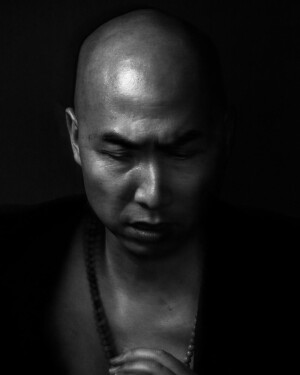
Michael Sakamoto is an interdisciplinary artist, scholar, curator, and educator active in dance, theatre, photography, and media art. His creative works have been presented in 15 countries throughout Asia, Europe, and North America. Recent internationally touring works include the intercultural dance theater trio, “Soil” (National Dance Project grantee), the hip-hop/butoh duet, “Flash,” with Rennie Harris, and the intermedia performance solo, “blind spot.” Michael’s essays and articles have been published in over a dozen journals and anthologies, and his book, “An Empty Room: Imagining Butoh and the Social Body in Crisis,” will be released by Wesleyan University Press in April 2022. He is former Assistant Professor in Dance at University of Iowa, Co-Director of Goddard College’s MFA in Interdisciplinary Arts Program, and theatre faculty at CalArts and Bangkok University. Current projects include: the butoh/ballet/classical music performance, “George/Michael,” with George de la Peña and Hyeyung Yoon (planned premiere 2023); the social practice and intermedia performance and installation work, “Our Utopia,” with dance, software, engineering, and gender/race studies researchers at UMass Amherst; and “Yakei,” a new collection of photo and literary criticism essays. More info at michaelsakamoto.org.

Douglas Sumi
Douglas Sumi
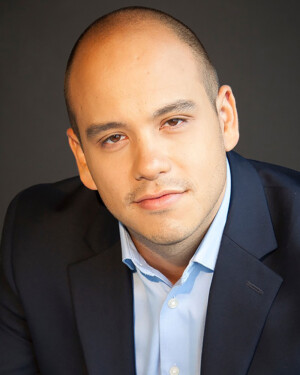
American pianist, Douglas Sumi, is a frequent collaborator with many of today’s artists and opera theaters. He is a versatile artist as a pianist and vocal coach and has a recognized commitment to song and opera. He has assisted conductors such as James Conlon, Plácido Domingo, and Patrick Summers and has worked with many great performers like Renée Fleming, Plácido Domingo, Itzhak Perlman, Carol Vaness, and many of today’s emerging young artists. He has led singers to top prizes of premiere competitions including Operalia, the Metropolitan National Council Auditions, BBC Cardiff Singer of the World, and the Richard Tucker Foundation. While in Los Angeles, he served on music staff at LA Opera and on faculty at the UCLA Herb Alpert School of Music. Currently, he serves as Chair of Voice at the School of Music of Boston University, and teaches courses in song literature, lyric diction, and opera for pianists.

Wynne Wan-Yee Szeto
Wynne Wan-Yee Szeto
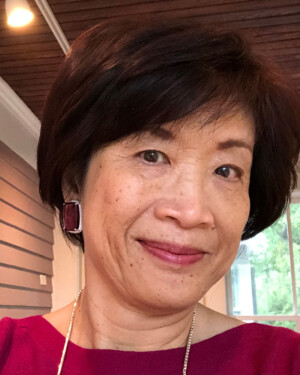
WYNNE WAN-YEE SZETO was born and grew up in Hong Kong while it was still a British colony. In 1970 she came to the United States to attend Mount Holyoke College in South Hadley, Massachusetts. Following receipt of her B.A. from Mount Holyoke, in Biochemistry, she enrolled in the Ph.D. program at Harvard Medical School, studying molecular biology, and received her Ph.D in 1981. Wynne was schooled in opera through many seasons of subscribing to the Metropolitan Opera performances. Her favorite composers are Bellini, Donizetti, Rossini, Puccini, and Verdi. She is interested in the differences and commonalities between Western opera and traditional Chinese opera. In addition to BLO, she supports the MET, the Arizona Sonoran Desert Museum and the National Tropical Botanical Garden (Kalaheo, HI). Wynne has lived in Winchester, Massachusetts for many years, along with her husband, Greg Moore, a lawyer, and daughter, an analyst at a Boston-based investment bank, who, has recently gotten her own apartment. Besides opera, she enjoys gardening, reading, making jewelry, cooking and traveling.

Giselle Ty
Giselle Ty
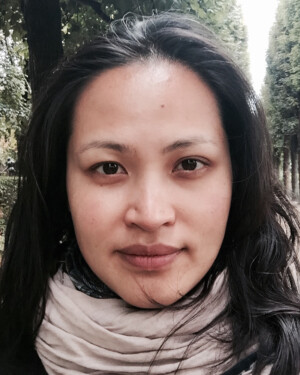
Giselle Ty is a theater and opera director who specializes in interdisciplinary, site-specific, and experimental work. She has directed for Boston Lyric Opera (Cavalleria Rusticana), Houston Grand Opera (HGOco), the Center for Contemporary Opera / National Sawdust, NYU Tisch School of Drama, Simpson College, Juventas New Music, Boston’s Guerilla Opera, and Harvard University. Engagements as associate and assistant director include productions with Boston Lyric Opera (Werther), Boston Symphony Orchestra, Tanglewood Music Festival, American Repertory Theatre, MIT Media Lab, Gotham Chamber Opera, Icelandic Opera, l’Opéra National de Bordeaux, and London’s Royal Opera House, Covent Garden.
Ty’s interests have also stretched into non-traditional genres—in particular, the creation of interdisciplinary, psychologically immersive experiences. Projects include collaborations with the Peabody Essex Museum, where she was invited to conceive and stage original work for the institution’s galleries and historic houses, and Invitation to an Empty Room, developed through a residency with New Georges Theatre, where she is an affiliate artist.
Before training in various movement and text-based theater techniques with resident artists at the American Repertory Theatre, SITI Company, and l’École Jacques Lecoq in Paris, Ty studied orchestral trumpet and art history at Northwestern University in Evanston, IL. She currently lives in London.

Mari Yoshihara
Mari Yoshihara
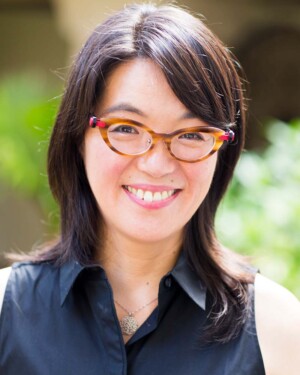
Mari Yoshihara is professor and chair of American Studies at the University of Hawai’i and specializes in U.S. cultural history, U.S.-Asian relations, literary and cultural studies, and gender studies. She is the author of Embracing the East: White Women and American Orientalism (Oxford, 2003), Musicians from a Different Shore: Asians and Asian Americans in Classical Music (Temple, 2007), and Dearest Lenny: Letters from Japan and the Making of the World Maestro (Oxford, 2019) as well as a number of publications in Japanese language. Her recent article on anti-Asian discrimination in American orchestras was published in the Symphony magazine in Fall 2021.
These artists, originally cast in BLO’s planned production for the 2020/21 Season, are engaged throughout and are featured in B. the artistic product of The Butterfly Process.

Yulan Piao
Cio-Cio-San
Yulan Piao | Lt. Pinkerton
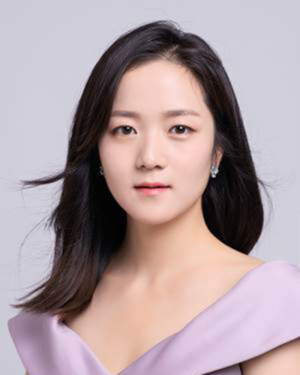
Korean-Chinese Soprano, Yulan Piao, was scheduled to make her Boston Lyric Opera debut as Cio-Cio San in Madama Butterfly. She has performed as Liu in Turandot with the New Jersey Association of Verismo Opera, as Musetta in La bohème with New Rochelle Opera. Previous credits include La bohème (Mimì), Gianni Schicchi (Lauretta), Die Zauberflöte (Pamina), Luisa Miller (Luisa), Così fan tutte (Fiordiligi), and Rigoletto (Gilda).
Recently, Ms. Piao received third prize in the Lois Alba Aria Competition and received first prize in both the Verismo Opera Competition and Vienna Summer Music Festival Competition. Past major awards include third prize in the Gerda Lissner International Vocal Competition, The Winner from the Career Bridges Grant Awards, the Encouragement Grant from Giulio Gari Foundation, Third Prize from the Connecticut Opera Idol Competition, and first prize in the Five Towns Music and Art Foundation.
Ms. Piao completed her Masters Degree at the Manhattan School of Music under the tutelage of Mignon Dunn.

Zach Borichevsky
Lt. Pinkerton
Zach Borichevsky | Lt. Pinkerton

Tenor Zach Borichevsky is “equipped with a flexible, bright voice that already has made him one of the most sought-after singers of his generation.” A series of significant débuts have established Mr. Borichevsky as one of the most thrilling vocal talents to appear on the international stage; he has created widely celebrated international performances in roles such as Rodolfo in La bohème with Finnish National Opera, Romeo in Roméo et Juliette for Teatro Municipal de Santiago in Chile, and Alfredo in La traviata for the Glyndebourne Festival.
Recently he joined the Lyric Opera of Chicago to cover the title role in its production of Faust and sang his first Narraboth in Salome with the Spoleto Festival, USA. He also performed Eisenstein in Die Fledermaus for Palm Beach Opera, reprised the role of Alfredo in La Traviata for Opera Grand Rapids, performed Cassio in Washington National Opera’s production of Otello and Rodolfo in La bohéme with Toledo Opera. In addition, he sang the tenor solo in Verdi’s Requiem for the National Philharmonic at the Kennedy Center and recorded a virtual Messiah with New Choral Society.
Future engagements include Alfredo in La traviata for Toledo Opera, Pinkerton in Madama Butterfly with Boston Lyric Opera, Edgardo in Lucia di Lammermoor for the Seoul Arts Center in Korea, and Handel’s Messiah for the New Choral Society.
Mr. Borichevsky has graced opera stages worldwide with performances as Edmondo in Manon Lescaut in his Metropolitan Opera début, Anatol in Vanessa for the Santa Fe Opera, Pinkerton in Madama Butterfly for Teatro Municipal de Santiago in Chile, Rodolfo in La bohème with English National Opera, Alfredo in La traviata with the Seattle Opera, and Tamino in The Magic Flute with Boston Lyric Opera. He has performed across the United States at Arizona Opera, Opera Carolina, Cincinnati Opera, and Opera Philadelphia.
In concert, Mr. Borichevsky has joined the Minnesota Orchestra, the St. Louis Symphony and Festival de Radio France et Montpellier under Santtu-Matias Rouvali, the National Symphony Orchestra at the Kennedy Center and the Netherlands Radio Philharmonic Orchestra, the Orquesta Sinfónica del Principado de Asturias under Rossen Milanov. Further highlights include appearances at the Aspen Music Festival, National Taiwan Symphony Orchestra, and the Chicago Philharmonic.
Mr. Borichevsky has been honored with numerous awards from the George London Foundation, The Metropolitan Opera National Council, Gerda Lissner Foundation, Opera Index, Mario Lanza Foundation, Shreveport Opera and Licia Albanese-Puccini Foundation. Mr. Borichevsky won second prize at the Loren L. Zachary National Vocal Competition for Young Opera Singers and third prize at Plácido Domingo’s Operalia Competition.

Nina Yoshida Nelsen
Suzuki
Nina Yoshida Nelsen | Suzuki
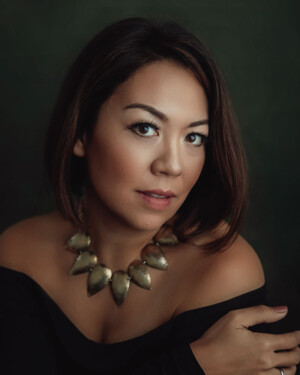 Mezzo soprano Nina Yoshida Nelsen makes her Boston Lyric Opera debut as Mama Lucia in Cavalleria rusticana, adding to an impressive lineup of performances scheduled for the 2021-2022 season, including her Bard Opera debut singing Mother Chen in Huang Ruo’s An American Soldier, a return to Opera Santa Barbara for a double bill of El Amor Brujo and Frugola in Il Tabarro, a Chicago Opera Theater debut singing Queen Queen Sophine in Mark Adamo’s Becoming Santa Claus, Mama in Jack Perla’s An American Dream at Kentucky Opera (a role she debuted in 2019 at Lyric Opera Chicago), and the Alto Solo in Beethoven’s 9th Symphony with the Rhode Island Philharmonic. Ms. Nelsen has performed two world premieres at Houston Grand Opera, and premiered Jack Perla’s An American Dream at Seattle Opera. Equally comfortable on the symphonic stage, she has performed with notable orchestras around the world, and made her European debut singing Suzuki in Madama Butterfly at Royal Albert Hall in London. A Santa Barbara native, Ms. Nelsen resides with her husband Jeff and their two sons in Bloomington, Indiana.
Mezzo soprano Nina Yoshida Nelsen makes her Boston Lyric Opera debut as Mama Lucia in Cavalleria rusticana, adding to an impressive lineup of performances scheduled for the 2021-2022 season, including her Bard Opera debut singing Mother Chen in Huang Ruo’s An American Soldier, a return to Opera Santa Barbara for a double bill of El Amor Brujo and Frugola in Il Tabarro, a Chicago Opera Theater debut singing Queen Queen Sophine in Mark Adamo’s Becoming Santa Claus, Mama in Jack Perla’s An American Dream at Kentucky Opera (a role she debuted in 2019 at Lyric Opera Chicago), and the Alto Solo in Beethoven’s 9th Symphony with the Rhode Island Philharmonic. Ms. Nelsen has performed two world premieres at Houston Grand Opera, and premiered Jack Perla’s An American Dream at Seattle Opera. Equally comfortable on the symphonic stage, she has performed with notable orchestras around the world, and made her European debut singing Suzuki in Madama Butterfly at Royal Albert Hall in London. A Santa Barbara native, Ms. Nelsen resides with her husband Jeff and their two sons in Bloomington, Indiana.
Levi Hernandez
Sharpless
Levi Hernandez | Sharpless

Baritone Levi Hernandez is gaining momentum as a sought-after artist on the operatic stage. The El Paso native has joined the rosters of leading opera companies including the Metropolitan Opera, San Francisco Opera, and Houston Grand Opera where he debuted as Sharpless in Madama Butterfly alongside Ana Maria Martinez and Joseph Calleja. In the 2021-2022 season, Mr. Hernandez returns to Lyric Opera of Chicago as Alvaro in Florencia en el Amazones, reprises the title role in Gianni Schicchi with Tulsa Opera, debuts with Hawaii Opera Theater as Sharpless in Madama Butterfly, returns to Intermountain Opera Bozeman for his role debut as Count Almaviva in Le nozze di Figaro, and performs Mahler’s Songs of a Wayfarer with Cheyenne Symphony Orchestra. In recent seasons, he has continued his longstanding relationship with the work of composer Daniel Catan, appearing as Rappaccini La Hija de Rappaccini with Chicago Opera Theater, sang Tonio in I Pagliacci with Opera Colorado and El Paso Opera, and Aba in El milagro del recuerdo Houston Grand Opera. He has sung Pa Joad in The Grapes of Wrath with Michigan Opera Theatre, Opera Theatre of St. Louis, Virginia Opera, Nashville Opera, Arizona Opera, and Chattanooga Symphony & Opera. He recently debuted with Opera Colorado as Marcello in La bohème, Inspector Kildare in Elizabeth Cree with Chicago Opera Theater, Alvaro in Florencia en el Amazonas with San Diego Opera and Madison Opera, and Ford in Falstaff with Intermountain Opera. He has covered the title role in The Death of Klinghoffer and productions of Die Frau ohne Schatten and Carmen with the Metropolitan Opera.

Omar Najmi
Goro
Omar Najmi | Goro
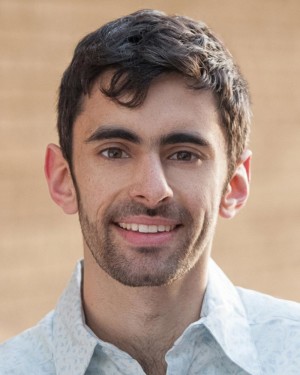
Omar Najmi is an alumnus of Boston Lyric Opera’s Jane and Steven Akin Emerging Artist program, where he served for three seasons as a tenor. He is thrilled to be returning as BLO’s first Emerging Artist composer. Omar made his compositional debut in 2019 with the world-premiere workshop performance of his opera En la ardiente oscuridad , which was made possible by the generous support of The Boston Foundation. The piece is scheduled for a new production at the Phoenicia International Festival of the Voice in 2021. Omar is currently working on his newest opera – This is not that dawn – about the 1947 Partition of India. As a performer, Omar’s particular passion for new music has led him to several collaborations with living composers. He looks forward to creating the title role in the world premiere of Joseph Summer’s Hamlet with Bulgaria’s Ruse Opera in 2021. Omar continues to perform regularly with the Boston Lyric Opera where he has recently appeared as Nick in The Handmaid’s Tale, Flavio in Norma , Beppe in Pagliacci , and Vanya Kudrjas in Katya Kabanova . He will return to BLO as Goro in their upcoming production of Madama Butterfly. Omar has additionally performed with Opera Colorado, Opera NEO, Annapolis Opera, Opera Maine, Odyssey Opera, Opera Fayetteville, Chautauqua Opera, Opera Saratoga, Emmanuel Music, American Lyric Theater, and Boston Opera Collaborative. Omar made his Carnegie Hall debut in 2018 as the tenor soloist in Mark Hayes’ Gloria. He has since returned twice – as a featured soloist in Talents of the World Inc.’s Caruso Tribute Concert, and as the tenor soloist in Dan Forrest’s Requiem for the Living with Mid America Productions. www.omarnajmi.com

Nicholas LaGesse
Prince Yamadori
Nicholas LaGesse | Prince Yamadori
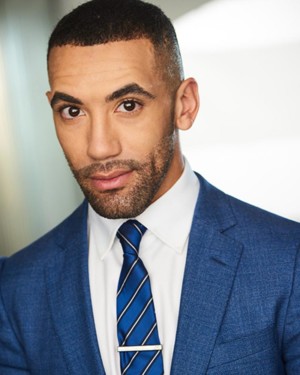
Baritone Nicholas LaGesse is a first year Jane and Steven Akin Emerging Artist at Boston Lyric Opera. Previous career highlights include Guglielmo in Così Fan Tutte with the North Shore Music Festival, covering Morales in Carmen with Martina Arroyo’s Prelude to Performance program, as well as Harlekin in Ariadne auf Naxos, the title role in Don Giovanni, and Danilo in The Merry Widow, all with Pacific Opera Project. A frequent performer of contemporary opera, he works regularly with recent MacArthur Grant recipient Yuval Sharon and his critically acclaimed, experimental opera company, The Industry. He helped create the role of Jameson in The Industry’s multi-location production of Hopscotch, as well as creating the role of Federzoni in composer Andy Akiho’s operatic adaption of Bertolt Brecht’s play Galileo. Nicholas has been honored as a finalist in the Palm Springs Opera Guild Competition, the winner of the Chicago Chapter of the National Association of Teachers of Singing (NATS) Competition, and was a Bella Voce award recipient in the Bel Canto Foundation Competition. www.nicholaslagesse.com

Jorgeandrés Camargo
The Bonze
Jorgeandrés Camargo | The Bonze
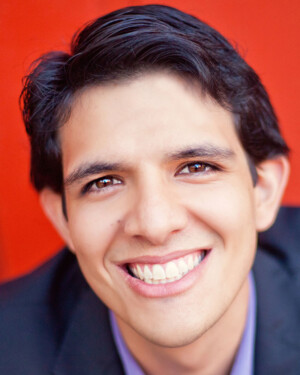
Jorgeandrés Camargo, Bass, currently resides in Philadelphia, Pennsylvania and holds performance degrees from Eastman School of Music and Boston University Opera Institute. He most recently worked with Boston Lyric Opera as the Servant in the animated production of The Fall of the House of Usher. Other recent performances include the role of Figaro in The Marriage of Fígaro with Boston Opera Collaborative, and Rocco in Fidelio (a virtual zoom opera) with Promenade Opera Project. Other roles include Il Gran Sacerdote in Nabucco, Mephistopheles in Louisville Ballet’s ‘Project Faust’, Pistola in Falstaff, Leporello in Don Giovanni, Don Alfonso in Cosí fan tutte, Bartolo in Le Nozze di Figaro, Geronimo in Il matrimonial segreto, Capitán in Florencia en el Amazonas, Prophet/King in Dark Sisters, Quince in A Midsummer Night’s Dream, and Roy Cohn in Angels in America. Mr. Camargo can also be heard on the Sound Mirror recording of Blitzstein’s The Cradle Will Rock. He has previously worked with Kentucky Opera, Ojai Music Festival, CoOperative, Crested Butte Music Festival, Opera Breve, First Coast Opera, American Lyric Theater, and Opera Saratoga.

Zaray Rodriguez
Kate Pinkerton
Zaray Rodriguez | Kate Pinkerton
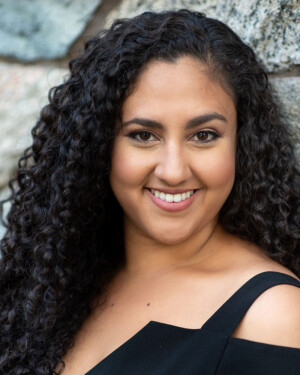
Cuban American mezzo-soprano Zaray Rodriguez has been a recipient of multiple grants and competitions including Career Bridges Grant, Heida Hermanns International Vocal Competition, Society of Arts and Letters National Competition, and was a Regional Finalist of the Metropolitan Opera National Council Competition 2019.
Operatic roles include Geneviève in Pelleas et Melisande, Aunt Hannah Watkins in Emmeline, and Cherubino Le Nozze di Figaro. Other favorite roles include the title role in Carmen, Mezzo in Philip Glass’ Hydrogen Jukebox, L’Enfant in L’Enfant et les Sortilèges, and Federico Garcia Lorca in Ainadamar. Rodriguez has performed Dinah in Trouble in Tahiti with the Aspen Music Festival chamber orchestra, Marcellina in Le Nozze di Figaro with Florida Grand Opera, and Lupe Marin and Dimas’ Mother in Frida with Florida Grand Opera.
Ms. Rodriguez is also an avid performer of new Music. Ms. Rodriguez has enjoyed singing the role of Asakir in Mohammed Fairouz’s Arab opera, Sumeida’s Song with Opera Maine; premiered the role of Lucinda in Evan Mack’s Lucinda y las Flores de Nochebuena, and most recently she performed and premiered Boston Lyric Opera’s commissioned work of ‘My name is Alondra’ by Omar Najmi. Ms. Rodriguez has been a young artist with Florida Grand Opera, Opera Theatre of Saint Louis, and is a current Emerging Artist with Boston Lyric Opera.
Read All About It!: “Saying Yes to Puccini, but No to His Stereotypes” – The New York Times
Press Release 11/17/21: WITH “THE BUTTERFLY PROCESS,” BLO EXPLORES A NEW WAY TO APPROACH THE OPERATIC CANON (PDF 297KB)
Questions? Feedback? Reach out to us at access@blo.org.
Artwork created by KUDOS Design Collaboratory.

